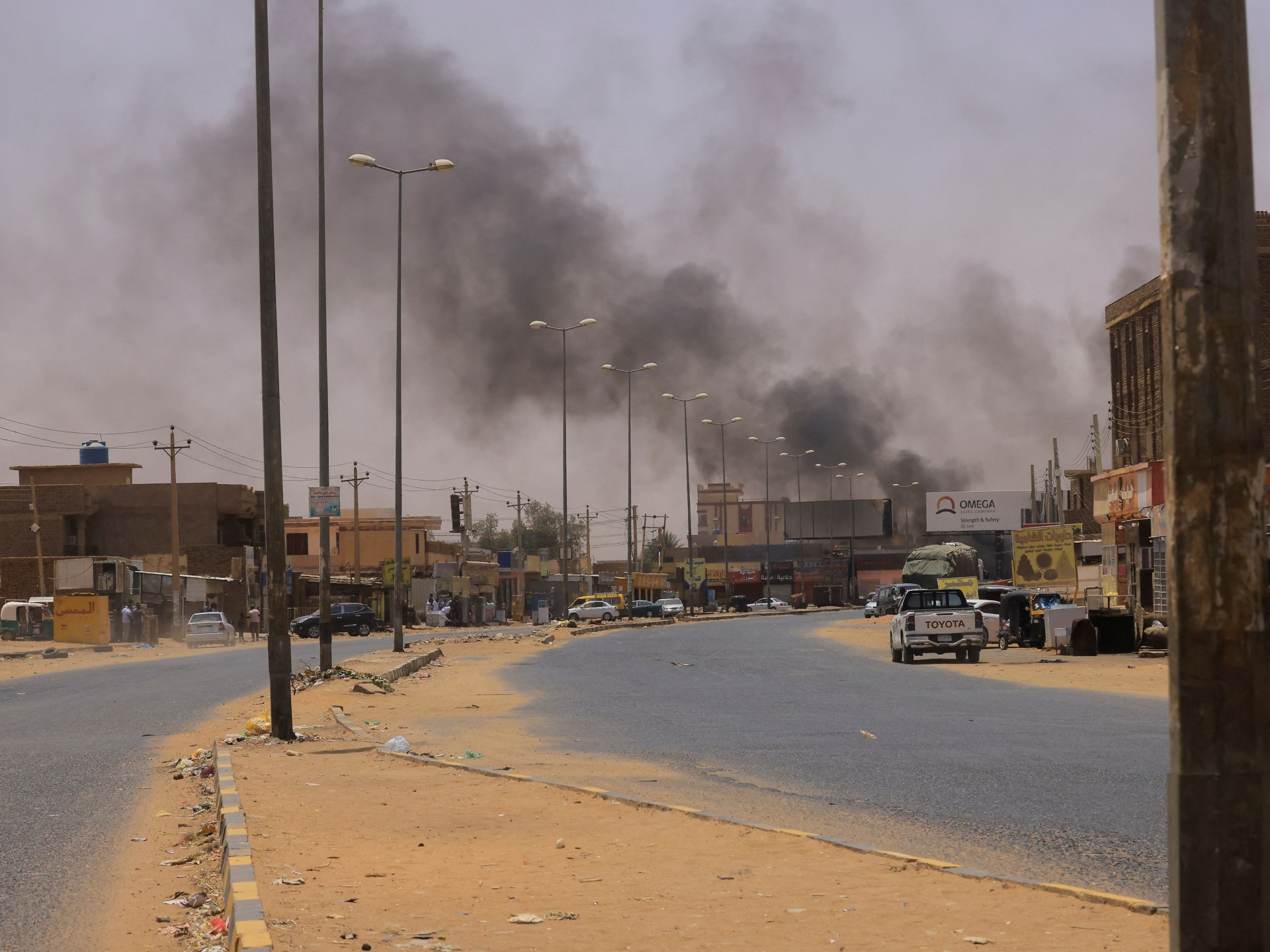Smoke rises in Omdurman during clashes between the Rapid Support Forces and the army (Reuters)
The war that has been going on in Sudan for 10 months has dealt a fatal blow to the Sudanese economy, which was already depleted after years of wars and isolation, with the continued closure of banks, the cessation of import and export movement, and the collapse of the value of the local currency.
Battles broke out in the country last April between the army led by Abdel Fattah al-Burhan and the Rapid Support Forces led by Muhammad Hamdan Dagalo (known as Hemedti), and left thousands dead, including 10 to 15 thousand dead in the Darfur region (west), according to estimates by experts from the United Nations.
The fighting also led to the displacement of more than 10 million Sudanese within the country and to neighboring countries.
Sudanese businessman Ahmed Al-Khair (a pseudonym), who works in exporting gum arabic, had stored a large quantity of gum south of Khartoum for export before the war.
He says, "I paid a lot of money to remove the amount of glue from the capital to members of the Rapid Support Forces. When I arrived in the government-controlled area, I was asked to pay another fee."
Ahmed Al-Khair bore these fees in order to transport his goods to the city of Port Sudan in the east, the only working port in the country.
He says, "The local authorities in Port Sudan asked me for new fees, and the rent for warehouses has increased six times."
Gum is extracted from the solid sap taken from the acacia tree, and it is an emulsifier of great importance used in various industries, from soft drinks to chewing gum, through pharmaceutical preparations.
Sudan is at the forefront of gum producing countries, accounting for about 70% of its global trade, according to the French Development Agency.
Despite all this cost and the delivery of the goods to the Sudanese city overlooking the Red Sea, the Sudanese businessman's money was not enough to complete the export process.
"I haven't been able to export the gum yet," he says.
A report by the Sudanese Ports Authority stated that the volume of exports and imports in 2023 decreased by 23% compared to the previous year.
Absence of the state
The complications do not stop there, as the suffering of exporters in general increased following a decision by the Sudanese Ministry of Finance to raise the value of the “customs dollar,” that is, the customs tariff index if exchange rates fluctuate, to record 950 pounds instead of 650 pounds.
The former president of the Sudanese Chamber of Commerce, Al-Sadiq Jalal, says, “This decision is tantamount to destroying the economy.”
The value of the Sudanese local currency has declined against the dollar since the outbreak of the war, with the dollar’s exchange rate currently recording 1,200 pounds, compared to 600 pounds last April.
The war also led to the closure of 70% of bank branches in the combat zones, according to a report by the Central Bank of Sudan, “the banks’ property, assets, and assets were looted.”
Sudanese economic analyst Muhammad Shaikhoun says, “The war has darkened the situation of the banking sector, which is already suffering from structural problems.”
For the second year in a row, the state budget was not approved in Sudan.
Economist Haitham Fathi believes that what is happening “reflects the complete absence of the state, which affects the economy in all its sectors.”
Al Jazeera Project
The International Monetary Fund reported in a report last January that “the conflict in Sudan has exacerbated the humanitarian crisis, and economic activity has stopped in large parts of the country, which has contributed to the continuation of negative growth rates (..) following the sharp contraction witnessed in 2023.” ".
The International Financial Corporation had expected Sudan's economy to contract by 18% in 2023.
As the war expanded to Al-Jazeera State in central Sudan, which includes one of the largest agricultural projects on the African continent on an area of two million acres, the agricultural area in the country declined so that the cultivated crops covered an area of only 37% of the total land suitable for agriculture, according to a report prepared by the “Fikra” Center. Sudanese Studies and Development.
Sudanese economic analyst Muhammad Al-Nayer says, “The extension of military operations to Al-Jazira State affected agricultural production in the country.”
The United Nations World Food Program warned on Wednesday that the war in Sudan had pushed the country to "the brink of collapse," with the vast majority of the population suffering from hunger.
"At this stage, less than 5% of Sudanese can afford a full meal a day," Eddie Roux, director of the World Food Program in Sudan, told reporters in Brussels.
Source: French

